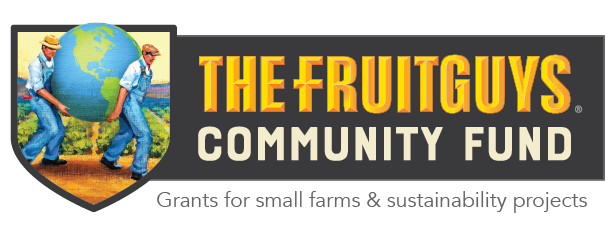Meet The FruitGuys Community Fund’s Class of 2016
This year, The FruitGuys Community Fund increased the number of grants awarded to small American farms and agricultural nonprofits to 10, providing a total of $40,133 in funding for sustainable agriculture projects.
The Community Fund, a nonprofit, fiscally sponsored project of Community Initiatives, received a record 110 applications for 2016’s sustainable agriculture grants, a 55 percent increase from 2015. Small farms and agricultural nonprofits from across the country proposed detailed sustainability projects aimed at increasing pollinators; conserving soil, water, and energy; and increasing harvests and food access for low-income communities.
Volunteers from across the country assisted in the grant review process. “This year’s review committee was the largest and most diverse to date, and the range of project types reflects their broad perspective on farm sustainability across the United States,” says Chris Mittelstaedt, founder and project director of The FruitGuys Community Fund and CEO of The FruitGuys. “The 10 farms that were chosen as grant recipients are being supported because of the hard work and deep thought that the review committee put into their analysis of projects proposed by the applicants.”
The FruitGuys Community Fund’s 2016 Grantees
The 2016 grantees’ farms are located in California, Wisconsin, Michigan, Pennsylvania, and Maryland. Their projects range from organic cover crops and urban orchards to owl box and beehive installations.
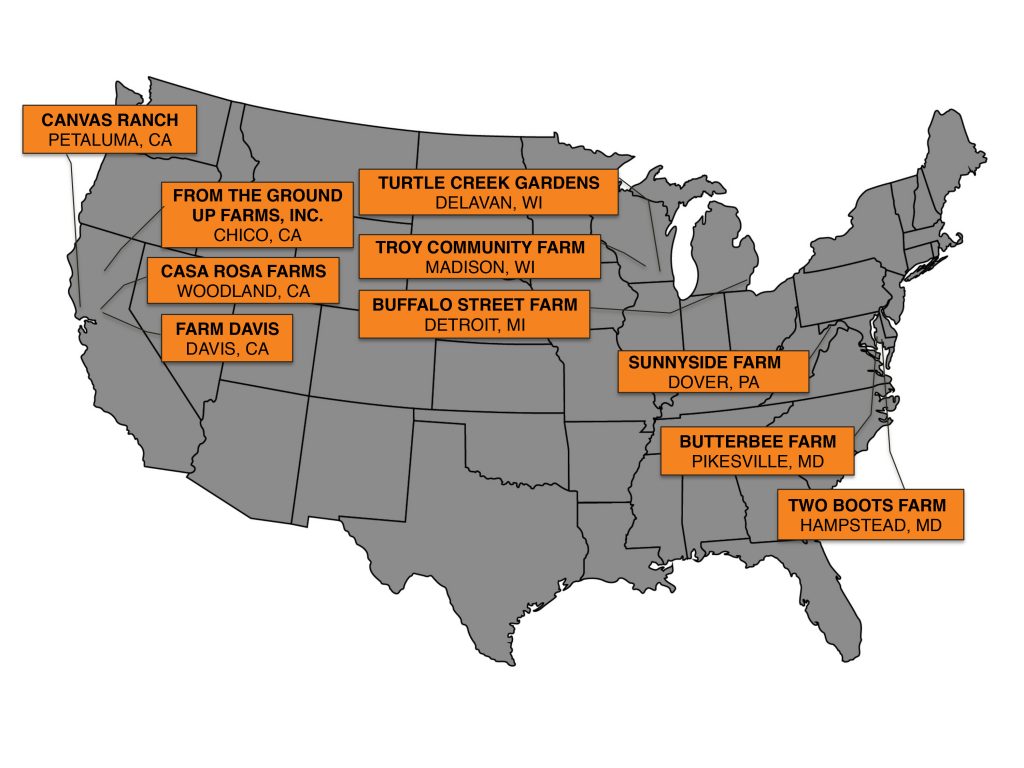
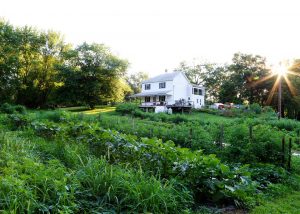 Two Boots Farm, a family farm just under 1-acre in Hampstead, MD, grows over 30 nutrient-dense fruit and vegetable crops that they sell through a farmers’ market and a 20-member CSA, as well as to various restaurants in the area. The farm also advocates for people to grow their own food by selling vegetable seedlings to home gardeners and organizations every spring. All crops, including seedlings, are produced without the use of synthetic pesticides or fertilizers. Their $5,000 grant will allow them to maximize their acreage and extend their growing season by building a 72-by-24-foot high tunnel to increase their seedling production. They plan to maximize every square foot of the high tunnel by growing vertically. To promote pollinators on the farm, they will attach two native bee houses on both end walls of the high tunnel. These native bee houses will help pollinate the farm’s fruiting crops, such as tomatoes, cucumbers, eggplants, peppers, and squash.
Two Boots Farm, a family farm just under 1-acre in Hampstead, MD, grows over 30 nutrient-dense fruit and vegetable crops that they sell through a farmers’ market and a 20-member CSA, as well as to various restaurants in the area. The farm also advocates for people to grow their own food by selling vegetable seedlings to home gardeners and organizations every spring. All crops, including seedlings, are produced without the use of synthetic pesticides or fertilizers. Their $5,000 grant will allow them to maximize their acreage and extend their growing season by building a 72-by-24-foot high tunnel to increase their seedling production. They plan to maximize every square foot of the high tunnel by growing vertically. To promote pollinators on the farm, they will attach two native bee houses on both end walls of the high tunnel. These native bee houses will help pollinate the farm’s fruiting crops, such as tomatoes, cucumbers, eggplants, peppers, and squash.
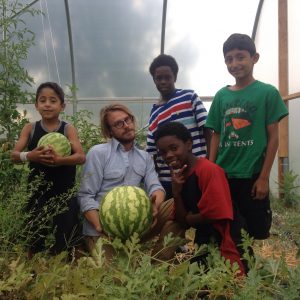 Buffalo Street Farm is one of five urban farms in Detroit, MI, that make up the City Commons CSA. City Commons is a city CSA in operation from June till late October. Buffalo Street Farm recently shifted production from specialty crops to perennial fruits and vegetables. In 2015, they established Detroit’s first table grape vineyard by planting 300 vines of two varieties. They employ community youth and make the farm accessible to all. Their $5,000 grant will allow them to purchase 100 fruit trees, three honeybee hives, native perennial plants, compost, drip irrigation, and cover-crop seed.
Buffalo Street Farm is one of five urban farms in Detroit, MI, that make up the City Commons CSA. City Commons is a city CSA in operation from June till late October. Buffalo Street Farm recently shifted production from specialty crops to perennial fruits and vegetables. In 2015, they established Detroit’s first table grape vineyard by planting 300 vines of two varieties. They employ community youth and make the farm accessible to all. Their $5,000 grant will allow them to purchase 100 fruit trees, three honeybee hives, native perennial plants, compost, drip irrigation, and cover-crop seed.
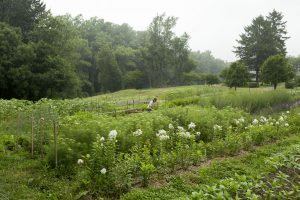 Butterbee Farm, a 2-acre farm in Pikesville, MD, grows flowers, edibles, and herbs. They are part of the Chesapeake Farm to Table cooperative, which sells local produce to restaurants in the Baltimore area. They also provide 10 tours each year, during which they teach other growers about their sustainable practices. Their $3,200 grant will allow them to transition an acre of land adjacent to their current farm that was formerly part of a conventional farm into sustainable production by applying a cover crop, compost, soil amendments, and pollinator-friendly plants.
Butterbee Farm, a 2-acre farm in Pikesville, MD, grows flowers, edibles, and herbs. They are part of the Chesapeake Farm to Table cooperative, which sells local produce to restaurants in the Baltimore area. They also provide 10 tours each year, during which they teach other growers about their sustainable practices. Their $3,200 grant will allow them to transition an acre of land adjacent to their current farm that was formerly part of a conventional farm into sustainable production by applying a cover crop, compost, soil amendments, and pollinator-friendly plants.
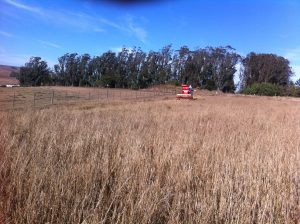 Canvas Ranch is a 28-acre family farm in Petaluma, CA, started by Deborah Walton and Tim Schaible. Together they produce vegetables, fruit, grains, and wool. Deborah also started a nonprofit, the North Coast Heritage Grain Alliance, to support small farmers pursuing alternative and rotational grain crops for food, beer, and spirits-making. Their $2,500 grant will allow them to purchase a grain dehuller to provide dehulling services to local grain producers. No one in the area owns this essential piece of equipment. Grains are a key crop for small-farm diversification and sustainability: overwintering maintains soils’ water-holding capacity, and crop rotation helps control pests and diseases and increases soil biodiversity.
Canvas Ranch is a 28-acre family farm in Petaluma, CA, started by Deborah Walton and Tim Schaible. Together they produce vegetables, fruit, grains, and wool. Deborah also started a nonprofit, the North Coast Heritage Grain Alliance, to support small farmers pursuing alternative and rotational grain crops for food, beer, and spirits-making. Their $2,500 grant will allow them to purchase a grain dehuller to provide dehulling services to local grain producers. No one in the area owns this essential piece of equipment. Grains are a key crop for small-farm diversification and sustainability: overwintering maintains soils’ water-holding capacity, and crop rotation helps control pests and diseases and increases soil biodiversity.
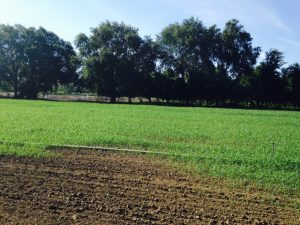 Casa Rosa Farms, a 55-acre family farm in Woodland, CA, produces certified organic, pastured, and grass-fed beef, lamb, pork, chicken, eggs, olives for oil, and specialty fruit crops for direct sale. Casa Rosa farmers Rachel and Anthony da Rosa, and their 5-year old daughter, Olivia, took over another 33-acre parcel two years ago and began conducting many sustainability and crop-related improvements on ground that had not been worked since the late 1960s. Their $5,000 grant will allow them to purchase a used forage cutter, which will allow them to cut their own hay as fodder for their animals and cut back on purchased feed.
Casa Rosa Farms, a 55-acre family farm in Woodland, CA, produces certified organic, pastured, and grass-fed beef, lamb, pork, chicken, eggs, olives for oil, and specialty fruit crops for direct sale. Casa Rosa farmers Rachel and Anthony da Rosa, and their 5-year old daughter, Olivia, took over another 33-acre parcel two years ago and began conducting many sustainability and crop-related improvements on ground that had not been worked since the late 1960s. Their $5,000 grant will allow them to purchase a used forage cutter, which will allow them to cut their own hay as fodder for their animals and cut back on purchased feed.
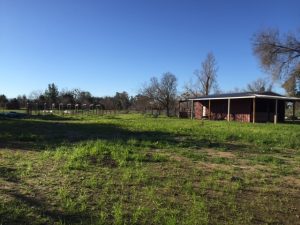 FARM Davis is a nonprofit organization in Davis, CA, that grows fruits and vegetables to be turned into meals for local low-income and homeless people, who can also learn to farm. FARM Davis is made up of a 2-acre parcel of land as well as two urban (front yard) lots. For the past six years, they’ve partnered with Davis Community Meals and Cesar Chavez Plaza to turn their donated produce into free healthy meals three times a week. Their $2,133 grant will allow them to build owl boxes as a natural pest control device and to buy a mower implement that will let their tractor mow red clover and other grasses.
FARM Davis is a nonprofit organization in Davis, CA, that grows fruits and vegetables to be turned into meals for local low-income and homeless people, who can also learn to farm. FARM Davis is made up of a 2-acre parcel of land as well as two urban (front yard) lots. For the past six years, they’ve partnered with Davis Community Meals and Cesar Chavez Plaza to turn their donated produce into free healthy meals three times a week. Their $2,133 grant will allow them to build owl boxes as a natural pest control device and to buy a mower implement that will let their tractor mow red clover and other grasses.
 From the Ground Up Farms, Inc., a nonprofit organization in Chico, CA, operates 10 community garden farms located on the sites of homeless shelters, residential treatment facilities, women’s shelters, youth homes, and day-care facilities. In addition to building gardens, they mentor residents and clients on how to tend the gardens, and use the food grown in their meals and the garden as therapy. Their $4,855 grant will allow them to convert several gardens to raised beds to ensure soil safety, save water, increase yield, and minimize maintenance.
From the Ground Up Farms, Inc., a nonprofit organization in Chico, CA, operates 10 community garden farms located on the sites of homeless shelters, residential treatment facilities, women’s shelters, youth homes, and day-care facilities. In addition to building gardens, they mentor residents and clients on how to tend the gardens, and use the food grown in their meals and the garden as therapy. Their $4,855 grant will allow them to convert several gardens to raised beds to ensure soil safety, save water, increase yield, and minimize maintenance.
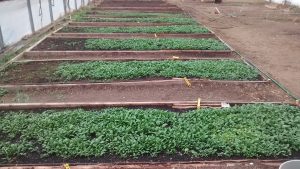 Sunnyside Farm, a 12-acre family farm in Dover, PA, produces pasture-raised beef, pork, eggs, Thanksgiving turkeys, open-pollinated and heirloom vegetables, and edible flowers. They use only compost and water, no added fertilizers or pesticides, and sell online to chefs and grocers and a farmers’ market, as well as farm direct. Their $5,000 grant will allow them to build a hoop house and test a theory that growing in shallow fabric slings the length of the hoop house can increase production eight times over.
Sunnyside Farm, a 12-acre family farm in Dover, PA, produces pasture-raised beef, pork, eggs, Thanksgiving turkeys, open-pollinated and heirloom vegetables, and edible flowers. They use only compost and water, no added fertilizers or pesticides, and sell online to chefs and grocers and a farmers’ market, as well as farm direct. Their $5,000 grant will allow them to build a hoop house and test a theory that growing in shallow fabric slings the length of the hoop house can increase production eight times over.
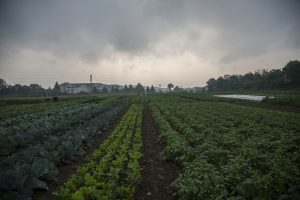 Troy Community Farm, a 5-acre farm in Madison, WI, produces certified organic vegetables, herbs, and cut flowers. The farm includes a 150-member CSA and a Beginning Farmer Training program that accepts 8 to13 interns and apprentices each year to learn small-scale organic vegetable production. The beginning farmers have weekly classes, educational field tours, and, at the end of the internship, the opportunity to run the farm on their own for a week. Their $2,500 grant will allow them to purchase beehives, bees, tools, supplies, protective gear, and incorporate hands-on beekeeping experience and instruction into their Beginning Farmer Training program.
Troy Community Farm, a 5-acre farm in Madison, WI, produces certified organic vegetables, herbs, and cut flowers. The farm includes a 150-member CSA and a Beginning Farmer Training program that accepts 8 to13 interns and apprentices each year to learn small-scale organic vegetable production. The beginning farmers have weekly classes, educational field tours, and, at the end of the internship, the opportunity to run the farm on their own for a week. Their $2,500 grant will allow them to purchase beehives, bees, tools, supplies, protective gear, and incorporate hands-on beekeeping experience and instruction into their Beginning Farmer Training program.
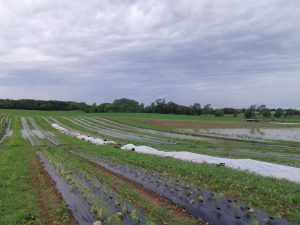 Turtle Creek Gardens is an 18-acre farm in Delavan, WI. They grow certified organic vegetables and sell them through their CSA, organic grocery stores, restaurants, farm direct, and a farmers’ market. Their $5,000 grant will allow them to construct swales to mitigate rainwater runoff from a neighboring conventional farm and prevent rainwater flooding on interior areas. The swales will be planted with grasses, forbs, perennials, and marketable crops.
Turtle Creek Gardens is an 18-acre farm in Delavan, WI. They grow certified organic vegetables and sell them through their CSA, organic grocery stores, restaurants, farm direct, and a farmers’ market. Their $5,000 grant will allow them to construct swales to mitigate rainwater runoff from a neighboring conventional farm and prevent rainwater flooding on interior areas. The swales will be planted with grasses, forbs, perennials, and marketable crops.
The 2016 grantees will share updates on their projects in August and December of 2016 and April of 2017. The FruitGuys Community Fund will issue its call for applications for the 2017 grant cycle in December 2016.
Want to get more involved?
- Volunteer for our Grant Review Committee. Help decide which projects get funded in 2017. For more information, please email: volunteer@fruitguyscommunityfund.org
- Sign up for The FruitGuys Community Fund newsletter to receive project updates.
